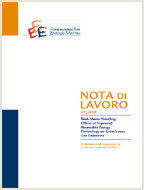Sensitivity to Energy Technology Costs: A Multi-model Comparison Analysis

17.11.2015
Valentina Bosetti (Bocconi University, Fondazione Eni Enrico Mattei, CMCC); Giacomo Marangoni (Fondazione Eni Enrico Mattei, CMCC, Politecnico di Milano); Emanuele Borgonovo (Bocconi University); Laura Diaz Anadon (Harvard Kennedy School – Harvard University); Robert Barron (University of Massachussets Amherst); Haewon C. McJeon (Pacific Northwest National Laboratory JGCRI); Savvas Politis (Brookhaven National Laboratory); Paul Friley (Brookhaven National Laboratory)
O30, O33, Q41, Q50, Q55
Sensitivity Analysis, Integrated Assessment models, Expert elicitation, Technology Cost
Climate Change and Sustainable Development
Carlo Carraro
In the present paper we use the output of multiple expert elicitation surveys on the future cost of key low-carbon technologies and use it as input of three Integrated Assessment models, GCAM, MARKAL_US and WITCH. By means of a large set of simulations we aim to assess the implications of these subjective distributions of technological costs over key model outputs. We are able to detect what sources of technology uncertainty are more influential, how this differs across models, and whether and how results are affected by the time horizon, the metric considered or the stringency of the climate policy. In unconstrained emission scenarios, within the range of future technology performances considered in the present analysis, the cost of nuclear energy is shown to dominate all others in affecting future emissions. Climate-constrained scenarios, stress the relevance, in addition to that of nuclear energy, of biofuels, as they represent the main source of decarbonization of the transportation sector and bioenergy, since the latter can be coupled with Carbon Capture and Storage (CCS) to produce negative emissions.
***
Suggested citation: Bosetti, V., G. Marangoni, E. Borgonovo, L. Diaz Anadon, R. Barron,
H.C. McJeon, S. Politis, P. Friley, (2015), ‘Sensitivity to Energy Technology Costs: A Multi-model Comparison Analysis’, Nota di Lavoro 98.2015, Milan, Italy: Fondazione Eni Enrico Mattei
